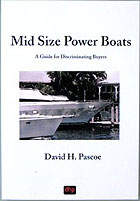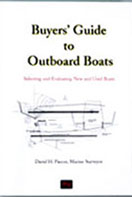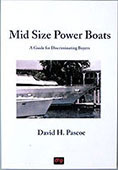In Part one we covered outboard boats. In Part II we'll take a look at some of the things that can go wrong with intermediate size sport fishermen and cruisers. I focus more specifically on sport fishermen because these are the people who spend the most time at sea, go further offshore, and who experience the most sinkings.
-Founderings
-Just Goin'n Fishin'
- How much is enough?
- Bilge Alarms
- Maintenance
- The Money Issue
- Crippling Legalities
Part
I
Small
Boat Safety at Sea - Outboard
Thanks to the Internet, we're getting a better idea of just how many tragedies at sea are occurring, and it's a lot more than most of us had realized. Unfortunately, while the USCG keeps track of such accidents, they are not made readily available to the boating public, but is given in a database format that most people can't use.
Founderings
Founderings occur because a boat fills up with water, and then sinks. In studying the many news media reports, I find that founderings are most often referred to as "capsizings," which means to turn over. This gives a completely wrong impression because the survivor stories usually clearly indicate that most boats do not capsize, but founder. Most major accidents result from human error, and failure to maintain the vessel properly is one of more common errors.
Most often, what causes larger boats to founder is not a matter of taking a large wave over the stern, though certainly this does happen from time to time. No, most often a study of the survivors comments points to a boat slowly filling up with water before a wave finally delivers the coup de gras. That was the case of a 1999 34' Luhrs, the VITAMIN C sinking off Galveston early this summer, a casualty in which two lives were lost. It so happened that a man who docked his boat near the VITAMIN C, a charter fishing boat, reported that he and others at the marina had noticed that THE VITAMIN C's bilge pumps were almost constantly running.
The owner of the boat was reported to be someone who had never owned a larger boat before, and was relatively experienced, despite having attended a few boating courses and having got his six pack license. So it was no surprise to his dockmates when the report of the loss of VITAMIN C came in.
We can infer from this that the boat owner had ignored the warnings from his dockmates, and didn't do anything to alleviate the problem. Though it's reported, under pressure from the boat builder, Luhrs, that the boat will be raised and a further investigation conducted since the boat went down in relatively shallow water. No doubt this tragedy will ultimately end up in litigation, so we'll say no more about it at this time.
This points up the rather casual attitude that a lot of boaters have toward ensuring that their boats are sea worthy. Unfortunately, far too many people treat boats like automobiles: just get in, start the engines and go. Folks, you can't treat a boat this way, not if you want to avoid ending up like the VITAMIN C. Boats are not recreational vehicles to treated with casual abandon, though many people do so. The reality is that boats require near constant maintenance to keep them sea worthy, particularly since the boat building industry itself no longer places the emphasis on sea worthiness that it once did.
Nowadays, everything is made lighter and cheaper in order to keep the cost down so that lots of people can afford to buy them, and the builders can profit by selling more.
A good example of cheapness that can cost lives are the plastic through hull fittings commonly in use today. Plastics, as we know, are highly vulnerable to ultra violet radiation from the sun. It causes plastics to become brittle and weaken. Every year numerous boats sink because these plastic through hull fittings fracture. Keep in mind that there is a heavy hose, attached to the other side of that fitting. As your boat is bouncing along on the waves, that hose is applying strain, often with a lot of leverage, on that plastic fitting. Eventually the plastic becomes brittle and the nipple shears off from the outer flange plate. At that point, the hull is open to the sea.
Usually this happens suddenly and without warning, leaving a hole in the side of the boat just a few inches above the water line. Now, when you're underway, a lot of water is coming into the hull. Of course, if your bilge pumps and wiring are not in good condition, you could suddenly find yourself in big trouble. I go into detail on this just to illustrate that there are many things that can go wrong without your knowledge and understanding.
Bilge pump failures are another source of tragedy. Nearly everyone asks, why can't they make more reliable pumps and float switches? The answer is that the problem is not a matter of poorly designed switches and pumps. No one will ever be able to figure out how to make a highly reliable system that doesn't require frequent inspection and maintenance that would be reasonably priced. Like the Rolex watch I own -- it's completely reliable against leakage, but the price of achieving this is not reasonable. It's terribly expensive, but on the other hand I've only purchased ONE watch in the last twenty years.
People simply will not pay for higher quality, so we have to live with the effects of low quality, which translates to the fact that our modern boats require more maintenance and more frequent inspections to ensure that they are seaworthy.
The VITAMIN C is only one example of boating tragedies that are occurring with ever greater frequency. This is happening in large part due to the cavalier attitude of boaters. In a vast majority of death cases, the news reports do mention that the occupants are cast into the sea without life jackets. They are found clinging to overturned hulls, coolers, seat cushions and other floatsam, but no life jackets. Why? If my experience tells me anything, it is that life jackets are only regarded as something the law requires them to have, not that they'll ever have need of them.
And so it is that the LJ's get stored up in the cabin, under a berth, where they can't be reached in time. Word has it that the two persons who drowned on VITAMIN C went into the cabin trying to get to the life jackets, but didn't make it in time. Technically, under those circumstances, the boat is not seaworthy because the life saving devices are not accessible.
Just Goin'n Fishin'
By far, the largest percentage of cases of foundering with loss of life involve fishing. In part, this is due to the manner in which boats are operated, without knowledge as to a particular boat's capabilities and vulnerabilities. This usually involves taking a wave over the stern, from which the boat doesn't recover. An awful lot of these sinkings have to do with poor design: non water tight cockpits and too much weight aft. Thus, a relatively small amount of water goes a long way to sink the boat.
Backing down hard on a fish has always been a bad idea due to the risk imposed. But combined with poor design, the results can be deadly, as more than a few examples have proved over the years. Fishermen are generally more knowledgeable than your basic cocktail barger and should know better. Most sport fishing boats are NOT well designed in this area, so that when you're taking waves over the transom, it's time to back off and rethink your methods.
To illustrate, a 12 x 12 cockpit filled with one foot of water would take on about 10,000 pounds or 5 tons of water. That would sink most boats, and yet flooding a cockpit to that depth is a serious risk when backing down.
Sport fishermen need to have what most would consider excessive bilge pumping capacity due to excessive strain that is placed on all it's systems. My experience tells me that most boats have under capacity by at least half of what is needed to deal with an emergency.
How much is enough?
That's a difficult proposition to figure out, since so much depends on the configuration of the internal hull. One needs to assess where the water is likely to come from, and where it will most likely settle, since all boats are not the same. For example, if the engine room bulkhead is water tight (though few are) you'd want to concentrate on getting the water out of that compartment, as well as the engine room.
The engine room bilge, of course, is critical. Once the engine front pulleys tough the water, they'll start throwing water all over the engine room. This usually causes gas engines to die with only a relatively small amount of water in the bilge, long before sinking is immanent. And without power, the vessel is helpless and in yet more danger.
If I were a serious offshore fisherman, I'd install bilge suctions from the main engine intakes, not on just one engine, but both, as only this kind of pumping capacity will really do the job when Mr. Murphy shows up. At all costs, you need to keep the water away from the engines and batteries.
Barring that, the least I'd want for something like a 35 foot boat would be my usual three Rule 2000 dewatering pumps, to which I'd add two Rule 4000 pumps as backups. These would be set up so that they do not normally operate for routine dewatering by being mounted up about six inches higher. Not just the float switches, but the pump itself so that there is no chance that any debris in the bilge is going to clog up the impeller during its long periods of disuse.
Personally, I do not like covered switches. Before I go out I like to lift the float and make sure that it works. That's hard to do with a covered switch. Plus, I would have a length of stainless wire rod bent in the shape of a hook. All I have to do is lift the hatch, hook the switch and lift, without having to crawl down there.
To prevent rushing water from damaging the switch, I would mount them close to a bulkhead with the flapper facing toward the bulkhead, about an inch or two away. That way, rushing water will not lift it up and tear it off.
Bilge Alarms
One of the most important safety devices that you can have aboard is a bilge high water alarm. Though this, as with bilge pumps, also requires frequent testing and maintenance. The value of a bilge alarm is that it warns you when water is accumulating in the bilge. And with that warning, you get the opportunity to do something about it before tragedy strikes.
Alarm float switches should be installed at two locations: the midships bilge point and the far aft bilge. This is because water runs to different parts of the hull based on boat speed. The alarm buzzer or bell must be sufficiently loud that it can be heard over the engine noise. The old way of doing this by just wiring in warning indicator lights is not adequate, because operators are often not looking for the light, and can fail to see it.
Alarms can be critically important for the reason that in most boats, the batteries are located deep in the hull. This is necessary to keep the center of gravity down, but it also means that batteries are among the first things to go under water. And with the loss of battery power, you have no radio. That's why so many deaths occur almost within sight of help.
Maintenance
Some of the attitudes expressed by boat owners are truly appalling. Such as, "It's a new boat, what could go wrong?" Or, "I had a mechanic check it over just last year." And, "My boat yard keeps it up for me." Wrong. Does your boat yard or mechanic go through the entire boat, checking everything? Or did he just have a quick look around? The fact is that boat yards and service people are not in the business of doing surveys, and don't want to be, owning to liability factors. As much as they'd like to, they don't go around looking for problems to fix because they will strenuously avoid giving the impression that they have checked out the boat and making any pronouncements that all is well. And that is a proper attitude, unless they want to go into the survey business.
The Money Issue
Yet another major problem is that many boat owners are very reluctant to spend money on their boats, other than to purchase new luxury items. I experience on insurance surveys that so many boat owners, when I discover a minor problem that needs correction, will strenuously argue with me about the need to make the change, fix or addition. Obviously, this is because so many boat owners are stretched to the end of their financial limit, and do everything possible to avoid spending money on necessary maintenance.
If that describes your situation, then the chances are that you are an accident waiting to happen. There is no better way to invite a major accident than by getting in over your head with a boat. You wouldn't do it with an airplane, so why would you do it with a boat. With either vehicle, when something goes wrong, you can't just get out and walk.
To give you an idea of just how irrational some people can be, here are a few examples.
On a haul out survey, three cracked plastic through hull fittings were found. One was 1" above the water line and completely broken off; the others were about 4". both in the bow. The owner was told that he needed to have them replaced before the boat went back in the water. The owner said he'd do it later. At that point, I declined to continue to do a sea trial, telling him that if he didn't do it now, I was going to take a taxi home. At that point, he got out a role of duct tape and taped them over. I called the taxi.
Then there was the customer who didn't like electric stoves. So, he installed a gas stove himself, with LP tank wedged between the seats in the cockpit. The installation violated every rule in the book. In case you don't understand why this is a problem, gas regulators ventilate to the open air, thus they discharge gas fumes. Plus the tank, being unsecured, was in danger of breaking loose, in which case the zinc alloy regulator could easily shear off, causing the tank to discharge it's full load of highly explosive gas into the boat.
I insisted that the system had to be removed, but the boat owner argued with me. And to ice this cake, the man referred to himself as a "Captain."
Situations like this are enough to make any surveyor throw up his hands in exasperation. Here we had a case of a boat that was capable of blowing up half a marina but, because eliminating the danger would cost the owner some money, he was going to try to avoid eliminating the hazard.
These are extreme examples, but lesser foolishness is commonplace. Such as the boat owner who never checks over anything in his boat and just runs it until it quits, sinks, catches fire or blows up. Boat as recreational vehicle. Folks, boats are not RV's, they are dangerous instrumentalities (as designated by law in the State of Florida) that have to be treated with knowledge and respect for the harm they can cause through careless operation.
Is it any wonder, then, that the number of grievous tragedies is growing by leaps and bounds? Most of these people are killing themselves and others out of ignorance and stupidity.
Crippling Legalities
For the boat owner, injury and loss of life is only a small part of the consequences when a serious accident occurs. Not only will you have to live with the fact that you may have caused the death of others (assuming you survive) as the vessel owner, the law charges YOU with the responsibility of maintaining the boat in a safe and seaworthy condition. If injury or loss of life occurs, you are legally responsible for that loss. And if you think your insurance liability coverage covers all this, you'd best think again. You cannot begin to buy enough insurance to cover the years of grief, or the potential judgments against you, that a wrongful death suit will entail. And, you'll have to sleep in the same bed with yourself.
The vast majority of cases of tragedies, similar to the one cited above, do not end at the grave site. They end in court, years and many ruined lives later.
Part I - Small Boat Safety at Sea - Outboard










David Pascoe is a second generation marine surveyor in his family who began his surveying career at age 16 as an apprentice in 1965 as the era of wooden boats was drawing to a close.
Certified by the National Association of Marine Surveyors in 1972, he has conducted over 5,000 pre purchase surveys in addition to having conducted hundreds of boating accident investigations, including fires, sinkings, hull failures and machinery failure analysis.
Over forty years of knowledge and experience are brought to bear in following books. David Pascoe is the author of:
In addition to readers in the United States, boaters and boat industry professionals worldwide from nearly 80 countries have purchased David Pascoe's books, since introduction of his first book in 2001.
In 2012, David Pascoe has retired from marine surveying business at age 65.
On November 23rd, 2018, David Pascoe has passed away at age 71.
Biography - Long version